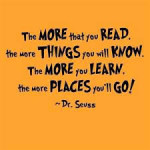1. Reading allows you to connect with the language, and it builds your vocabulary within a specific context – which makes your speaking stronger.
Many people “moan and groan” when presented with the prospect of having to read something – anything! As a lover of language, written or spoken, this was never a problem for me as I love to read literature of all types. However, as a teacher of English, I realize that not all my students feel the same way that I do, and so I asked myself how I could help my students to enjoy reading more. It seemed like the best answer was: only read what you are interested in!
You should put extra effort into finding a form of literature that is appealing to you – don’t read anything that seems boring to you! I have found in my experience that there is something for everyone, whether it is a paragraph of text or dialogue, a comic strip, a news article, a famous poem, a short book or even a series of novels! If your teacher has presented you with a text that you are not interested in, SPEAK UP, and tell them! The most important thing for you and your English language learning is to choose a subject that is not only useful in daily life, but also very interesting to you.

(more…)







